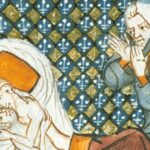 Institute of Historical Research (Web)
Institute of Historical Research (Web)
Time: Tue., 25.04.2023, 5:30-6:45 PM (UK time)
Venue: virtual space – via London
Javier Cuevas (Univ. of Malaga): Spanish Queer Histories during the Franco Dictatorship (1960s)
17 April 1966, a young woman from Granada commits suicide in a central hotel in Barcelona. The forensic investigation determined that her death was the result of drug intoxication. While the police investigation focused on her group of friends in the Andalusian city, four “invertidos” (homosexuals), whose statements were taken, legal proceedings were opened against them, and 4 photographs and a total of 8 letters written in the days prior to her friend’s suicide were confiscated. The Provincial Historical Archive of Malaga holds the judicial files of the Special Court for Vagrants and Thugs of Granada, including the documents of this case. The research focuses on the letters and personal photographs found in the court files kept in this institutional archive. The visual material will be analyzed in relation to the content of the letters which is extremely interesting as it reveals that the motive for the suicide was an unwanted pregnancy, as the friends advised her to have an abortion as soon as possible, although there are also references to possible sexually transmitted diseases. The letters include interesting cultural references such as comments on films („Last Year in Marienband“ or „Zorba the Greek“) and poems that the group read, as well as drawings made by themselves and the „queer“ pseudonyms of each one. There are also references to Torremolinos, a touristic town an hour and a half far from Granada, one of the few Spanish cities where during Franco’s dictatorship it was possible to find LGBT-friendly bars, thanks to the arrival of international tourism and the circulation of counter-cultural ideas.
Ona Bantjes-Ràfols (Carleton Univ.): Oral Histories of Queer Barcelona in the 1970s
Barcelona’s reputation as a queer city has largely been solidified through its culture in the 1970s. The bars and drag shows in the Raval neighbourhood, gay rights marches on the Rambles and the public presence of artists like … read more (Web).
